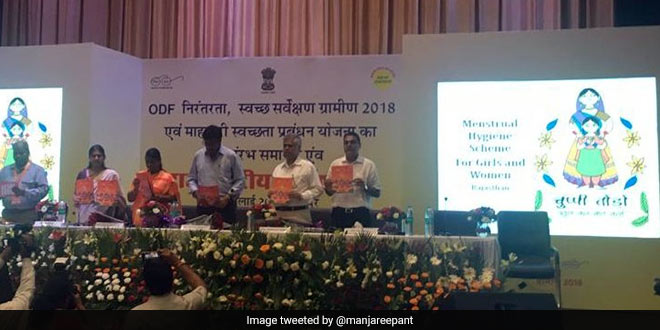Highlights
- Ministry of Women and Child Development will celebrate 'Chuppi Todo Diwas'
- Menstrual hygiene to be included in curriculum of administrative bodies
- Research and development of low cost sanitary napkins also on agenda
New Delhi: With a goal to encourage women in rural areas to adopt menstrual hygiene practices and handle their periods with dignity and safety, the Rajasthan government’s launched a menstrual hygiene management campaign on July 31. The campaign, which is a joint effort between the departments of Women and Child Development, Panchayati Raj and Rural Development, and Health and Family Welfare, will address the issue of taboo related to menstruation and encourage women in rural areas to speak more freely about menstrual hygiene issues in the state’s rural areas.
The scheme was launched by state Minister for Women and Child Development Anita Bhadel. To encourage women to speak freely and frequently about menstrual hygiene, the Ministry will observe ‘Chuppi Todo’ (break the silence) Diwas every three months throughout the state. The day will see several activities across rural areas in the state, held in collaboration with district administrations, to encourage and give women a platform to TALK about menstrual hygiene in public.
The department aims to normalise menstrual hygiene and encourage more women to speak about it. The more women from rural areas speak about it, we will get to know the kind of problems they face and work towards resolving them. We are hoping to see large scale participation in the quarterly Chuppi Todo days, said Roli Singh, Secretary, Ministry of Women and Child Development, Rajasthan.
Apart from Chuppi Todo Diwas, the Ministry will also start mainstreaming the topic of menstrual hygiene. One of the first steps by the Ministry will be to include menstrual hygiene as a part of training curriculum designed for elected representatives in administrative bodies like panchayats and gram sabhas, Anganwadi workers, child care centers and shelter homes. Many women who belong to such shelters and care centers will be introduced to what menstrual hygiene is, the importance of safe practices and using sanitary napkins. All self-help groups (SHGs) have been asked to promote menstrual hygiene awareness via plays and educational sessions. SHGs have been asked to specially focus on use and disposal of sanitary napkins so that women know about the importance of safely disposing of pads after use.
“We will collaborate with self-help groups, NGOs and other ministries to reach out to women across rural Rajasthan. Resources will be shared between all the important departments of the government to ensure that the campaign is successful. The Ministry is also gearing up to partner with educational institutes to encourage research and development of low cost sanitary napkins. Menstrual hygiene day will also be celebrated on May 28,” said Ms Singh.
The campaign aims to reach out to 20 million women in the state. In February this year, Rajasthan Chief Minister Vasundhara Raje allotted an amount of Rs 76 crore to provide free sanitary napkins to women in rural areas. Last month, Haryana too announced a scheme to provide sanitary napkins at Rs 1 to students. The recent removal of GST from sanitary napkins is being seen as a progressive move towards making sanitary napkins affordable for women, in a country where nearly 23 million drop out of school due to lack of awareness about menstruation. Rajasthan’s menstrual hygiene management programme looks to ease the problems related to menstrual hygiene, while simultaneously addressing the issue of taboo in menstruation.’
NDTV – Dettol Banega Swachh India campaign lends support to the Government of India’s Swachh Bharat Mission (SBM). Helmed by Campaign Ambassador Amitabh Bachchan, the campaign aims to spread awareness about hygiene and sanitation, the importance of building toilets and making India open defecation free (ODF) by October 2019, a target set by Prime Minister Narendra Modi, when he launched Swachh Bharat Abhiyan in 2014. Over the years, the campaign has widened its scope to cover issues like air pollution, waste management, plastic ban, manual scavenging and menstrual hygiene. The campaign has also focused extensively on marine pollution, clean Ganga Project and rejuvenation of Yamuna, two of India’s major river bodies.


























